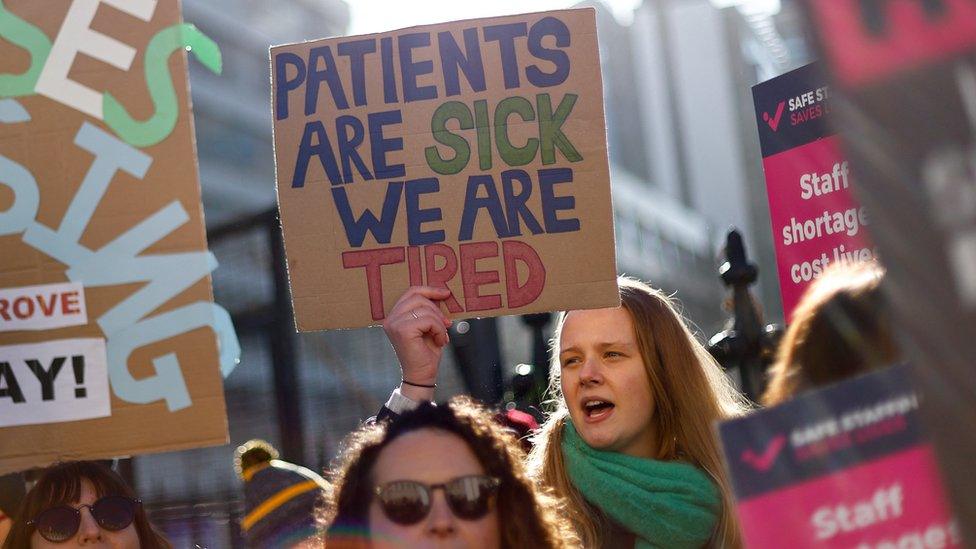Ministers in legal move to cut nurse strike short
- Published

The walkout will affect emergency departments, intensive care, cancer wards and other wards
Health Secretary Steve Barclay is to ask judges to rule whether part of the next nurse strike is unlawful.
The government wants the High Court to assess whether Tuesday - the last day of the walkout in England - falls outside the Royal College of Nursing's six-month mandate for action.
It believes the mandate will have lapsed by Tuesday - the 48-hour strike is due to start at 20:00 BST on Sunday.
The RCN accused ministers of using "draconian anti-union legislation".
"The only way to deal with bullies is to stand up to them - including in court," said RCN general secretary Pat Cullen.
"It's so wrong for the government to use taxpayers' payers money to drag our profession through the courts."
But she said if the courts found in favour of the government she would have no option but to cut the walkout short.
Mr Barclay's decision to take legal action follows a request from hospital bosses.
The RCN argues the strike falls within the required six-month period from when votes were cast in its ballot for industrial action.
But NHS Employers said it had legal advice that the action would be unlawful.
NHS Employers says it believes ballots closed at midday on 2 November 2022, meaning action on 2 May - the last day of the planned strike - would not be covered by the strike mandate.
It had argued that could invalidate the whole strike, but the government is now just contesting the part of the strike that falls on the 2 May, the Tuesday.
Mr Barclay said: "Despite attempts by my officials to resolve the situation over the weekend, I have been left with no choice but to proceed with legal action.
"I firmly support the right to take industrial action within the law - but the government cannot stand by and let a plainly unlawful strike action go ahead nor ignore the request of NHS Employers. We must also protect nurses by ensuring they are not asked to take part in an unlawful strike."
Why are nurses striking?
The RCN rejected a government pay offer for England of a 5% pay rise for 2023-24 and a one-off payment of at least £1,655 to top up last year's salary, depending on staff grade.
The union announced its members had rejected the offer by 54% to 46%.
If the court finds the strike to be unlawful, the RCN said it would have to accept the judgement as it would "never do anything illegal".
The planned walkout from 20:00 BST on 30 April to 20:00 BST on 2 May will involve NHS nurses in emergency departments, intensive care, cancer wards and other wards.
Nurses have already walked out twice this year - on 6 and 7 February and on 18 and 19 January - but on those dates there were exemptions, so nursing cover was maintained in critical areas.
The government has said strike action with no national exemptions would put patients at risk.

Are you a nurse with a view on the strike? Are you a patient affected? Please share your experiences by emailing haveyoursay@bbc.co.uk, external.
Please include a contact number if you are willing to speak to a BBC journalist. You can also get in touch in the following ways:
WhatsApp: +44 7756 165803
Tweet: @BBC_HaveYourSay, external
Please read our terms & conditions and privacy policy
If you are reading this page and can't see the form you will need to visit the mobile version of the BBC website to submit your question or comment or you can email us at HaveYourSay@bbc.co.uk, external. Please include your name, age and location with any submission.
Related topics
- Published19 March 2023
- Published15 April 2023
